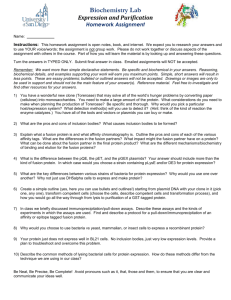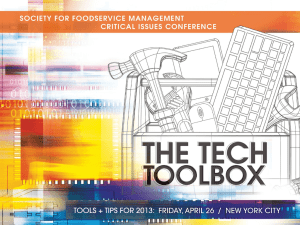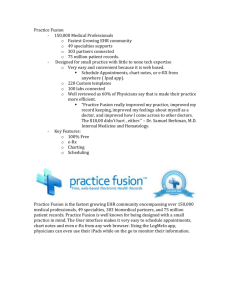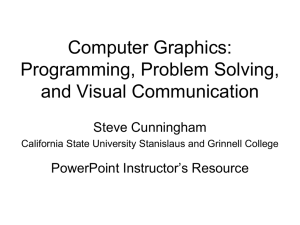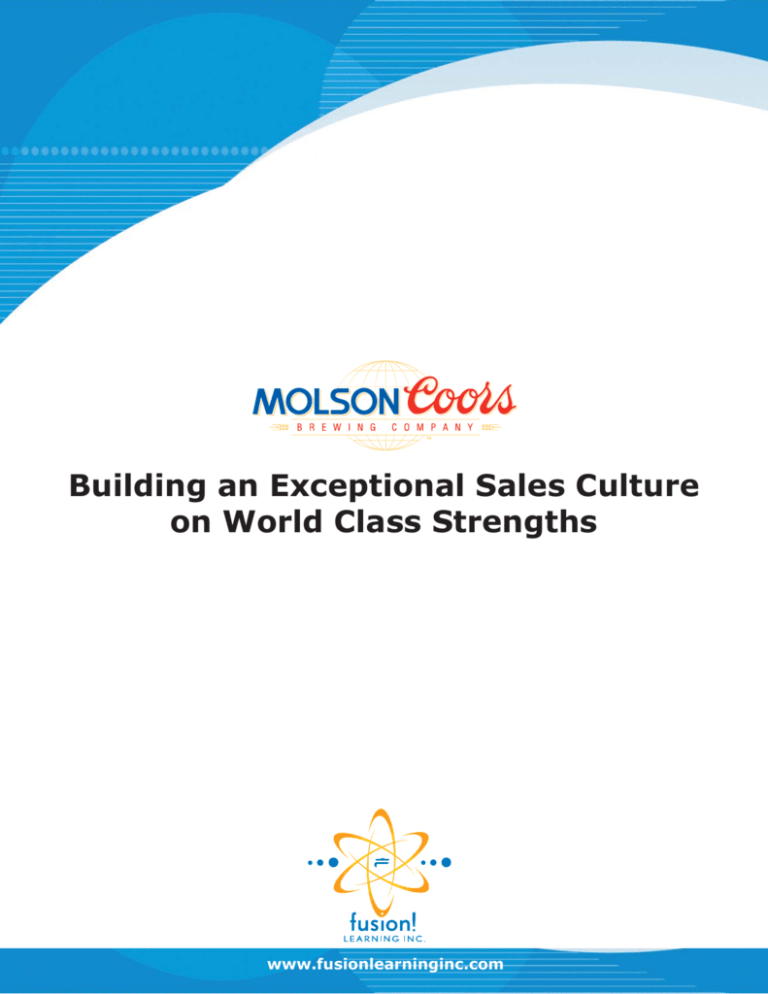
Building an Exceptional Sales Culture
on World Class Strengths
www.fusionlearninginc.com
Sales Success Stories
“Building an Exceptional Sales Culture on World Class Strengths” is one in the Sales Success Stories
Series published by Fusion Learning to share and celebrate the success stories of our clients.
The cases in the series are based on Fusion Learning’s international sales performance solutions.
We thank our Clients for assisting us in developing these success stories.
In Brief:
A strong corporate culture is an incalculable asset, a powerful binding force that tells people what to value
and how to act, no matter what situations they find themselves in. A strong corporate culture can also be
a roadblock to change if change is presented the wrong way.
Molson, Canada’s oldest brewer, had a sales culture over 220 years deep. Molson representatives courted
bar owners, hoteliers and restauranteurs – about 25% of the national market – with a mix of friendship,
fair dealing and personal style. But the rise of data-driven national chains has raised the stakes on every
sales call to playoff levels, with as much as one per cent of national consumption riding on a single
presentation. Could the Molson team be ready to target with the necessary precision, while still playing
with the flair and fun that beer represents? Snap the cap on this tale to read how they did it.
With Fusion Learning’s help, Molson has turned their existing culture into a foundation and springboard
rather than a roadblock.
@ Copyright. Fusion Learning Inc. All rights reserved.
Building an Exceptional Sales Culture on
World Class Strengths.
Beer, one of humanity’s consistently favourite drinks,
is a drink to pleasure.
Beer is for celebrations, a reward for hard work
well done or a game well played. The beer market,
however, is something else.
“We sell simple products,” says Roy Hryn, Vice
President for North American Key Accounts, “but
that doesn’t mean they’re easy to sell.”
Changes in the market have made sales a more
difficult, more high-stakes game. “The pie isn’t
growing,” says Rick Tousaw, Area Vice President
for Ontario, “and fighting for a bigger piece of it is
driving trade costs up. Some people are reacting
by just spending more, but we’re saying that if
we’re going to spend more, we want to invest in
areas that will drive consumers to our business, in
the tie-breakers that will help the consumer make
the right choice more readily.”
One of Molson’s investments, training with Fusion
Learning, is helping customers to make the right
choices in a market that is arguably changing
faster than at any time in more than 220 years of
company history.
Since 1786, Molson has had a history of making
the right choices itself, successfully associating
itself with the national game, as well as
other sports that conjure images of vigorous
achievement. In 2005, Molson solidified its
continental position with a merger with the
prestigious US brewer, Adolph Coors, to become
Molson Coors Brewing Company.
This merger was just one of many global mergers
and acquisitions, as brewers sought synergies
across borders and oceans with more efficient ways
of serving drinkers’ enthusiasm for beers from
other countries. This new enthusiasm for premium
imported brands is one of the few bright spots
in the business. Although beer consumption had
enjoyed an exciting period of growth through the
“
latter half of the 20th century, changed attitudes
and demographics had by the last decade shifted
the beer business almost to a zero-sum game.
Moreover, changes in the hospitality landscape had
increased the stakes dramatically.
The Changed Landscape
The Canadian beverage alcohol market is unique in
the world. Under pressure from temperance forces
in the early part of the 20th century, the United
States and Canada went their separate ways. The
Americans adopted Prohibition; Canada created
complex regulatory regimes. When Prohibition was
shown to be unworkable, it was abolished; the
regulatory regimes, however, remain.
In Ontario, Canada’s largest market, beer reaches
consumers through three principal channels.
Brewers sell their product directly to the consumer
through The Beer Store, an enterprise collectively
owned by the brewers, and through the provincial
agency, the Liquor Control Board of Ontario
(LCBO). They sell indirectly, in what the industry
calls on-premise sales, through hotels, restaurants
and bars. Sales through the LCBO have become
more important in recent years as the agency
targeted the beer category as a key growth
platform, alloting increased shelf space, increased
number of brands and permitted more in-store
marketing, but the big change in sales has been
the rise of National Accounts. On-premise sales
are still, overall, a highly fragmented market that
has to be addressed in detail, but the National
Accounts are a world unto themselves, of strategic
importance given their impact on sales. One chain
of sports bars, for instance, sells more than one
per cent of all the beer consumed in Canada.
Selling to a National Account this large is very
different from selling to one location or even a
small chain. “A single entrepreneur hasn’t much
use for information from us,” Roy Hryn notes,
”
We sell simple products but that doesn’t mean they’re easy to sell.
Roy Hryn, Vice President - North American Key Accounts
Building an Exceptional Sales Culture on World Class Strenghts
1
“
If our people can uncover a customer’s needs, they can turn those
needs into a very powerful selling story. Fusion Learning is very
good at provoking people to understand that process.
Roy Hryn, Vice President - North American Key Accounts
“but a large restaurant chain may do as much
business as we do, so they need the same type of
information to make a decision.”
Although the National Account sales teams were
willing to share information, it wasn’t clear that
information was getting to customers in a way they
could appreciate. A lot of selling is telling a story,
says Roy Hryn, but customers weren’t always
getting the right story, or they were getting a story
that was so over-elaborated that they couldn’t
make use of it. “It was always an overload,” he
says.
The company already had a selling process called
M.O.L.S.O.N. to help people focus information on
the customer, but it needed more depth. A Molson
team examined several proposals. “I realized after
the fact,” remembers Jeff Armstrong, Director
of Sales Training, “that the processes, skills and
behaviours that Fusion Learning applied to us were
exactly the skills they later helped embed in our
organization. They asked thoughtful questions to
help us shape where exactly we wanted to go as a
sales culture. They walked the walk.”
The National Account group was the first to
receive Fusion Learning training to sharpen their
ability to dig into the customer’s needs and then
communicate the value of the Molson brand
in terms of those needs. One of the key tools
they learned is the Thoughtful Question – one
that invites the customer to step outside the
traditional sales/customer role and share an
understanding of the needs that are really
important.
“The value of probing for a solution rather than
jumping in and making a presentation,” says
Shane Chambers, Sales Manager for National
Accounts, “really stood out for me. A customer
will often have a solution or at least a direction in
his mind. If you can get there, it makes your job
a lot easier.”
Recently, Shane Chambers and his team held an
initial meeting with a long-term account whose
top leadership had just gone through a wholesale
change. “Before,” he says, “we would have gone
in and told them, ‘This is what we do.’ In this
situation – we worked
on this with the Fusion
Learning group – we sent
a letter asking, ‘Where
are you going?’ and
‘How can we help you
get there?’ That really
set the tone for a good meeting. Intelligent people
appreciate it when you come in and listen to them,
rather than come in and download on them.”
”
Terry Rudiak, also a Sales Manager for National
Accounts, describes a similar meeting with the
National Account responsible for one per cent of
all beer sold in Canada. The account has a strong
history – it reaches back to the founders’ original
location – but there were simmering problems. The
Account Team took their Fusion Learnings to heart
and, to understand the issues more clearly, visited
franchisees across the country, asking Thoughtful
Questions and videotaping the answers. What
they discovered enabled them to negotiate with
knowledge and thus, strength. “We wouldn’t have
missed all the issues we discovered,” says Terry
Rudiak, “but we never would have understood and
responded to all the regional and franchise stuff.
That was amazing.”
That experience has changed the way he deals
with customers. “I’m asking more questions now.
Not like, ‘Why do you need that [competitor] tap?’
but ‘How does that [competitor] tap affect your
business?’ I’m not going to show them the data
we have, because they won’t believe me, but if I
ask the right questions, they’ll find the answers I
want.”
“
The key to manage the change
to The Molson Way is at the
sales manager level. When
you see the light come on for
someone who has been with the
company for 20 years as well as
for someone who just came from
outside Molson, you understand
you’ve got traction, so we’re in a
good place right now.
”
Rick Tousaw, Area Vice President - Ontario
Building an Exceptional Sales Culture on World Class Strenghts
2
Roy Hryn witnessed another presentation put
together by three managers who used a Fusion
Learning example as their template. “It was a
really good thought-starter and catalyst,” he
remembers, “a good precursor to telling the story.
It wasn’t the defining piece, but it separated us
from the competition and we ended up with the
business.”
Success at the National Account Level led naturally
to adoption of the Fusion Learning programs for the
field representatives, who service local and regional
accounts as well as local LCBO outlets. In addition
to the issues tackled at the National Account level,
Fusion Learning’s work had to address the lack of
consistency across the province.
“We used to have a culture that was almost wholly
reflective of the personality of the local sales
manager,” says Rick Tousaw. “They all had their
unique approaches, and when we tried to crossdevelop someone by moving them from Ottawa to
London, it was like they’d moved to Mars.”
That was beer culture then. Today, he says, it’s
time to see beer as a packaged good that should
be sold with the same process and discipline as
any other top tier packaged good organization and
the Molson Way to Manage is the key to instilling
consistency and discipline into sales. “Fusion
Learning has played a valuable role in pulling the
organization along and learning best practices,
while avoiding the pitfalls that other companies
have fallen into.” This is more necessary because
field representatives have taken on the LCBO
responsibility, where managers are just as processand information-driven as their counterparts in a
large grocery chain.
But being process-driven doesn’t mean that
the representatives have to surrender their
individuality. “We really appreciated the Fusion
Learning work,” says Sudbury Sales Manager
Clayton Bertrand, “first because it was ”beerready” for us – it built on things we
were doing already – and second because it
“
lets the guys keep their own creativity and style
– ‘here’s the frame, you paint the picture.’ People
learned to think through the approach before they
went in – how to make the call and what they want
to achieve by the time they leave. It’s a process,
but when they’re with the customer, that process is
transparent. What the customer sees is that we’re
getting better at what we do for them– probing
and asking better questions, negotiating better. It’s
done wonders for our selling skills.”
The Thoughtful Question is as useful a tool locally
as it is in National Accounts. Jeff Armstrong
recounts a recent in-market coaching call with
a rep: “During the call she asked the customer,
“What can [this competitor] do for you that I
can’t?” The customer paused for a very long
moment and then there was an outpouring from
him. That question made him stop and think about
what was important to him. Our person got back
in there, did the work and showed commitment.
In 2 months, we had all the business back. After, I
asked her where that question came from and she
said, ‘I got it 2 days before in the Fusion Learning
session on understanding customer needs.’”
The in-market coaching, described by Rick
Tousaw as “the main takeaway here’, also is a hit
with Clayton Bertrand. Clayton has significantly
enhanced his in-market coaching time by
accompanying his representatives on their calls
and supporting them with predetermined coaching
goals, “my folks know what I’m looking for and
that creates a really good learning atmosphere for
both of us.”
Speaking to a group of executives about the Fusion
Learning experience and its results, Rick Tousaw
said, “Right now the results are more qualitative
than quantitative. Our research tells us that worldclass sales organizations had one thing in common
– they have a clear sales process design and they
systematically manage against that process. We
had done a nice job of shaping a sales process, but
we had not systematized our management process.
The Way To Manage is just that, a systematic way
We needed to embed a consistent Molson Way into the company.
Fusion Learning respected our culture, they respected the
processes that we had established and they helped us deepen
them.
”
Rick Tousaw, Area Vice President - Ontario
Building an Exceptional Sales Culture on World Class Strenghts
3
to manage against the process. It’s early days for
that, but our work with Fusion Learning is really
starting to nail that consistency. The Molson Way
To Manage is our biggest opportunity.”
“There are some numbers we can talk about. First,
we have targets for promoting from within; now,
we’re not just matching them, we’re exceeding
them, so we are developing the skills and
competencies for future leaders and we’re setting
people up for success. That’s an exciting thing to
measure. Second, the Ontario market has been
very challenging in past years, but our dozen
strategic brands grew at three times industry
growth. That’s a key indicator for the success of
our work with Fusion Learning.”
Fusion Learning
Who We Are
Fusion Learning is one of Canada’s leading full service sales performance firms, with an international
reputation for enabling Clients to shape sales culture and deliver targeted results. We provide the
expertise of over 20 professionals – facilitators, consultants, learning designers, writers, project leaders,
graphics designers, and administrative support – who together develop and deliver solutions to your sales
performance challenges.
We have an array of experiences to draw from, and our Shared Purpose guides our thoughts and actions.
Passionate Learning Leaders:
• Dedicated to excellence
• Recognized for our collaborative learning solutions
• Enabling Clients to shape sales culture and deliver targeted results
What We Do
Fusion Learning designs and delivers sales and service performance solutions. Either by leveraging our
extensive library of proven core learning programs, or by developing a custom solution through an in-depth
understanding of your unique needs.
Our capabilities include: leading edge core learning programs and processes, targeted selling skills, practical
sales management, and facilitating sales strategy.
We customize our core programs and systems so they are culturally specific and resonate for your
organization.
And we take great pride in causing lasting change.
How We Can Help
We believe we can help you address many of your sales and service performance needs.
Whether it’s crystallizing sales strategy for the organization, developing targeted capabilities for customerfacing professionals, sales management development, or a combination of initiatives.
Whether you’re looking for a one day session, or an integrated, multi-phased curriculum driven by your
organization’s strategic direction.
As a full service sales performance and implementation organization, we would welcome the opportunity to
meet with you to understand your needs, to explore how we can best enable and embed sales performance
in your organization, and to earn your business.
Building an Exceptional Sales Culture on World Class Strenghts
4
“A Powerful Change Vehicle”
A one-minute guide to Fusion Learning’s
High Performance Sales Culture
Fusion Learning has completed a comprehensive Survey of Sales and Human Resource Executives to
study High Performance Sales Cultures. That research uncovered five challenges that Sales organizations
face today. This model has emerged from our research. The High Performance Sales Culture Model
illustrates the interconnection between each of the key elements, forming a sales system for success.
High Performance Sales Culture
Client/Customer
Sales Strategy
Let’s highlight some key findings that led to the
model:
Client/Customer:
The long term viability of any sales organization
depends upon its ability to identify and satisfy the
high priority needs of its Clients/Customers - to
forge a connection that has two way communication
and respect.
Sales Strategy:
Sales
Performance
Sales
Management
Sales
Capabilities
In order for a sales organization to get where it
wants to be, it must first have a clearly articulated
Sales Strategy of where it wants to go. When
asked, “Does each member of the sales force use
the sales strategy to guide daily actions, and make
operational decisions?”, the average response was
5 out of 10.
Sales Management:
Sales Management appears to be the highest point
of leverage in a High Performance Sales Culture!
Sales Meetings, for example, are held monthly or
Performance Measurement
less frequently in 55% of companies surveyed and
Systems & Accountability
their productivity is rated as 6 out of 10. Sales
Pipeline/Funnel – only 33% of organizations have
an easy to follow process and when asked about the pipeline driving sales productivity, the average
response was 4.7 out of 10. Feedback from Sales Managers to Salespeople - 44% of organizations do not
have a model for providing feedback.
Sales Capabilities:
When asked “if each member of the sales force is highly effective in the communication skills needed to
secure sales and build strong Client relationships ” - the average response was a disappointing 5.8 out of
10, with 40% of organizations rating it as 5 out of 10 or less!
Performance Measurement Systems and Accountability:
A critical component of a high performance sales culture that many organizations have in place, but do
not effectively support.
Fusion Learning specializes in enabling Clients to create and sustain High Performance Sales Cultures,
customizing solutions based on unique Client needs in any and all aspects of the Model.
Building an Exceptional Sales Culture on World Class Strenghts
5
If you would like information about any of
Fusion Learning’s programs and capabilities,
please contact:
Scott Gilmore
Partner and Vice President
Fusion Learning
366 Adelaide St. East
Suite 224
Toronto, Ontario M5A 3X9
416.424.2999
scott@fusionlearninginc.com
www.fusionlearninginc.com

